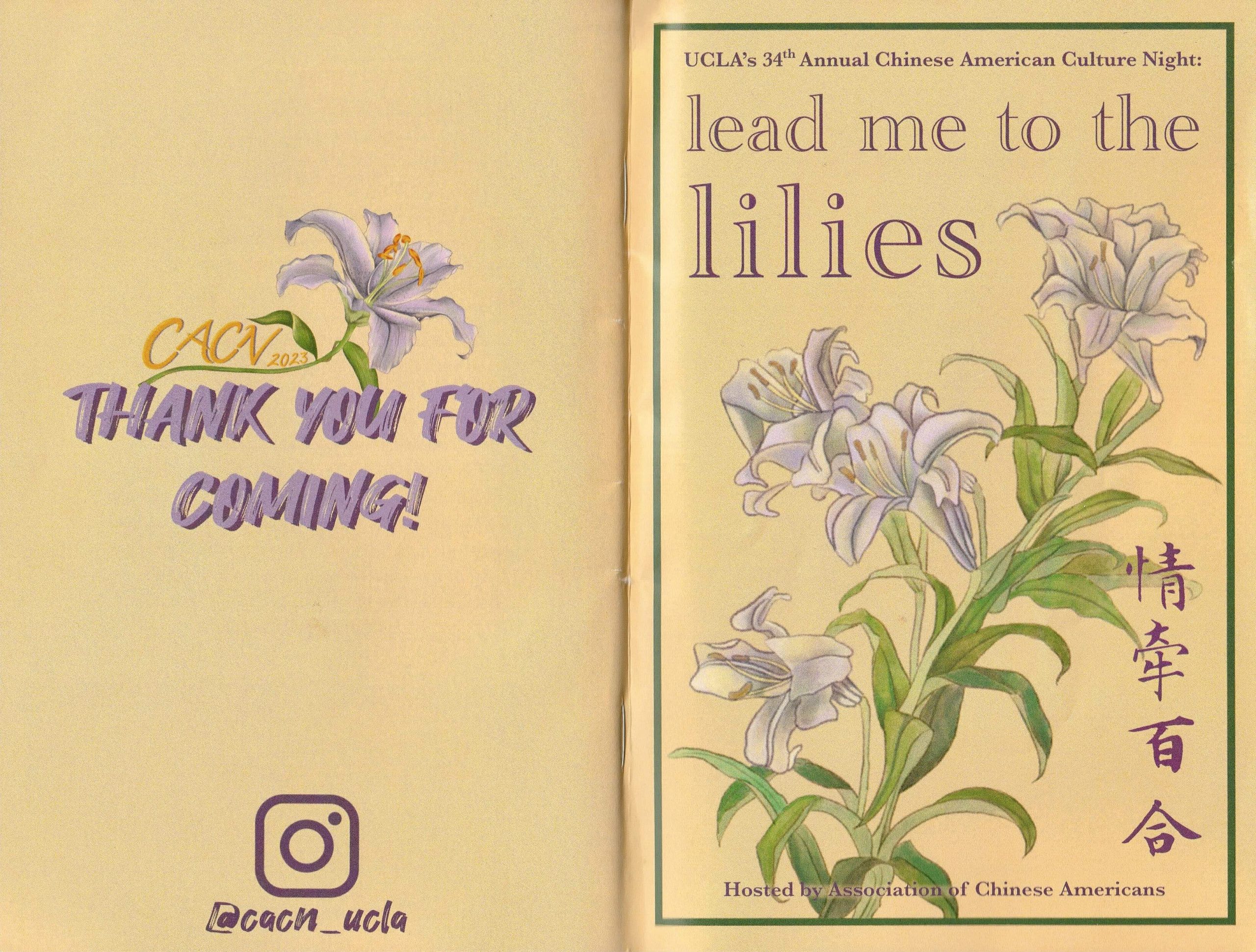The program handed out by UCLA’s Association of Chinese Americans on Chinese American Culture Night 2023. Photo by Christopher Ikonomou/OutWrite.
On May 6, 2023, UCLA’s Association of Chinese Americans hosted its 34th annual Chinese American Culture Night. The three-hour production featured performances by several Chinese cultural clubs and its main show, “lead me to the lilies.” As we celebrate Asian American and Pacific Islander Heritage Month throughout the month of May and anticipate Pride Month in June, “lead me to the lilies” beautifully portrays certain nuances of the queer, second-generation Asian American experience.
Written by third-year psychology student, Michele Hinh, and fourth-year microbiology, immunology, and molecular genetics student, Zoë Finch, “lead me to the lilies” is a play that follows May, a queer, second-generation Chinese American student, after the recent death of her older brother, Henry. We find May at a critical point in her life as she navigates her and her family’s grief, a budding romance with her long-time crush, and tensions within her bicultural and queer identities. She faces mounting pressure from her parents, struggling to reconcile the difference between who she is and who her parents want her to be. With the help of her (ghost) brother, May faces the realities of loss and identity, learning to truly embrace who she is while bridging gaps with those around her.
May’s internalized shame over “not being enough” for the unrealistic expectations of her parents is only compounded by her queerness. In other aspects of her life, May might have more agency to reconcile the difference between her parent’s expectations and May’s reality, specifically in her career and biculturality. May wants to pursue writing, and though this is against her parent’s wishes, she argues that can still be successful. Her biculturality, in which May doesn’t know Mandarin or Cantonese, could be compromised by her learning the languages while engaging with a Chinese-American (not simply Chinese) culture alongside her parents. Her queerness, however, cannot be reconciled in this way; unlike her career aspirations or biculturality, there is no way to learn, grow, or achieve queerness within her parents’ expectations. May specifically struggles over her parents’ hope that she will have kids with an economically successful Chinese man.
It is easier for her to remain closeted and uphold the status quo than to be seen for who she is. In turn, May internalizes her parent’s offhand homophobia and heteronormativity as part of the shame she faces from their neglect and disappointment. “Lead me to the lilies” tells a story of a queer Asian-American experience that resonates with — at least for me — a reality often untold, capturing the struggles of Asian-American biculturality within a conversation about queerness and “staying true to one’s self.”
In the context of increasing attacks against the rights of queer — especially transgender — individuals in the U.S. in recent months, “lead me to the lilies” reminds us of the interpersonal and internal struggles faced by queer individuals beyond institutional violence. At the same time, the play shows us how far we’ve gotten to be able to tell such stories. As Hinh and Finch note in the program of the show, “Although our story does not directly talk about being transgender in our community, we recognize that we would not be able to tell such a story without the labor of trans activists that came before us.” It is also by the work of queer activists of color that we are able to witness an underrepresented story about being both queer and Asian.
Bringing all of these experiences together — the experiences of being detached from Asianness and a deeper sense of non-belonging within queerness on top of the rigid expectations from one’s parents — meaningfully tells a uniquely queer and Asian story. And to have a story like this seen and celebrated on a stage for a substantial yet intimate audience was powerful, beautiful, and necessary.
Credits:
Author: Jericho Tran-Faypon (They/Them)
Copy Editors: Bellze (They/Xey), Bella (She/They)

